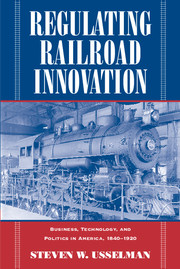Introduction
Published online by Cambridge University Press: 12 August 2009
Summary
innovation (n): 1. the introduction of something new; 2. a new idea, method, or device: novelty.
regulate (vt): 1. to govern or direct according to rule; 2. to bring order, method, or uniformity to; 3. to fix or adjust the time, amount, degree, or rate of.
– Webster's New Collegiate DictionaryThe subject of this book is, quite literally, a contradiction in terms. Genuine novelty knows no rules. We cannot reduce to routine what we do not yet know. Yet of course we cannot resist trying. For like death and taxes, technical innovation has proven to be an irresistible force in modern affairs. Its pervasive influence, its startling ability to transform lives and upset social norms, ineluctably draws our attention. For most of humanity, the encounter comes as a pragmatic response to concrete realities. For those historians, economists, and others who enjoy the luxury of observing technical change from a distance, the desire to tame innovation assumes a more abstract guise. Like theologians pondering the afterlife, they seek to decipher its mysteries, to identify patterns and governing principles, and thus to impose a measure of order and regularity upon this most beguiling of phenomena.
This book contributes to that effort by evaluating the prolonged attempt by Americans of a century ago to seize control over the most profound technological innovation of their lives: the railroad.
- Type
- Chapter
- Information
- Regulating Railroad InnovationBusiness, Technology, and Politics in America, 1840–1920, pp. 1 - 12Publisher: Cambridge University PressPrint publication year: 2002



